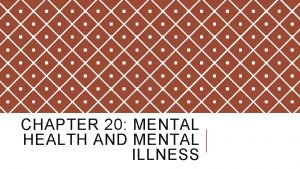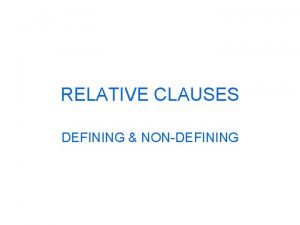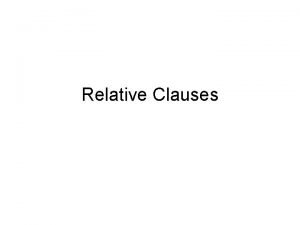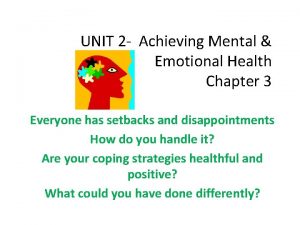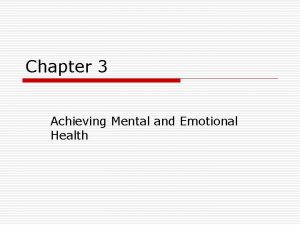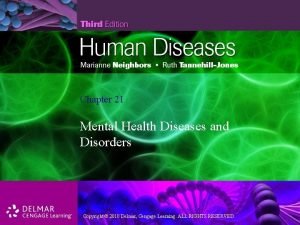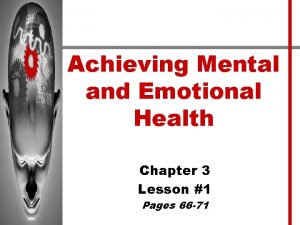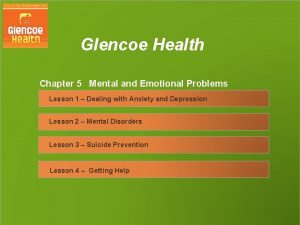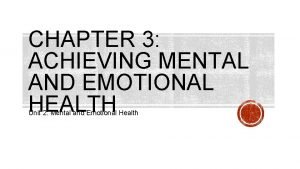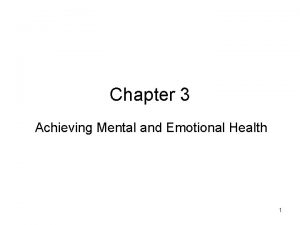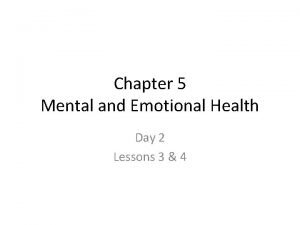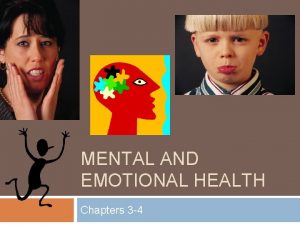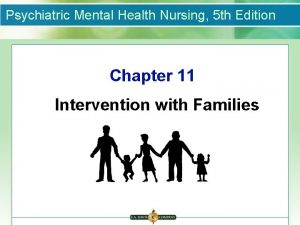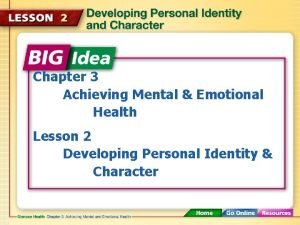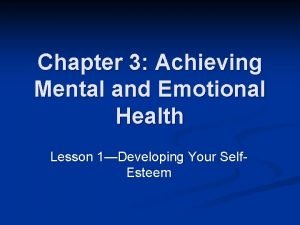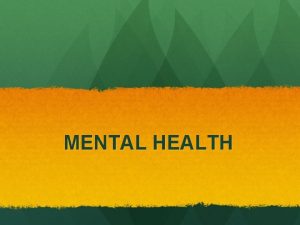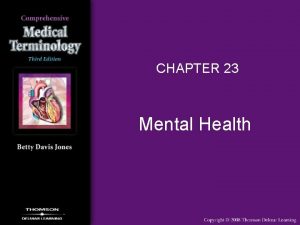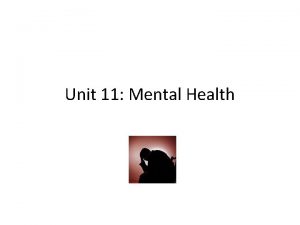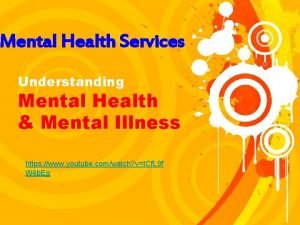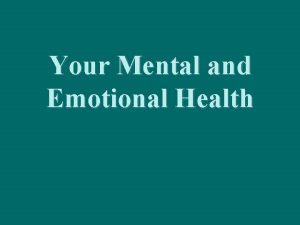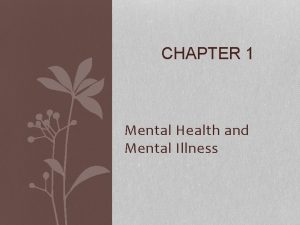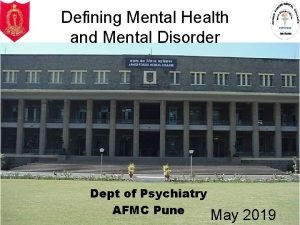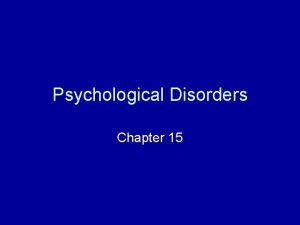Psychological Health Chapter Three Defining Psychological Health Mental























- Slides: 23

Psychological Health Chapter Three

Defining Psychological Health (Mental Health) is a level of psychological well-being, or the absence of mental illness 2

Defining Psychological (Mental) Health You are not psychologically healthy because: you are normal (average) you conform to social norms you never seek help for personal problems appear to be OK 3

Abraham Maslow’s Hierarchy of Needs Abraham Maslow (psychologist) believed that people are motivated to achieve certain needs; some needs are more important than others. When one need is filled, people seek to fulfill the next need To understand human motivation, Maslow studied individuals that he believed to be successful. 4

Maslow Developed a Hierarchy of Needs 5

Self-Actualization (A Closer Look) Maslow concluded that visibly successful people achieved self-actualization, & that they share the following qualities: Realism Acceptance Self-image Self-esteem Autonomy Authenticity Intimacy Creativity 6

Psychological Disorders 7

Nerve Cell Communication 8

The Nervous System and Psychiatric Disorders A dysfunctional interaction between neurotransmitters and their receptors is thought to affect some psychiatric disorders. Serotonin and norepinephrine alter the overall responsiveness of the brain and are responsible for mood, level of attentiveness and other psychological states. Antidepressants work by targeting key neurotransmitters in the brain 9

Psychological Disorders Mood or Anxiety disorders Usually the result of many factors Genetic differences (we all process information differently) Learning and life events Anxiety Fear that is not a response to any definite threat 10

Anxiety Disorders Simple Phobia Persistent and excessive fear of a specific object, activity or situation Social phobia Fear of humiliation or embarrassment while being observed by others 11

Anxiety Disorders Panic disorders Sudden unexpected surges in anxiety Rapid and strong heart beat Shortness of breath Loss of physical equilibrium Feeling of losing mental control Can lead to agoraphobia 12

Anxiety Disorders Generalized anxiety disorder (GAD) Excessive worry about future events Worries take over rational thought Obsessive-Compulsive disorder (OCD) Obsessions = recurrent, unwanted thoughts Compulsions = repetitive, difficult-toresist actions Post-Traumatic Stress disorder (PTSD) Reaction to a severely traumatic event 13

Mood Disorders Depression Most common mood disorder Affects young and older adults Takes the form of: Feeling sad and hopeless Loss of pleasure Poor appetite, weight loss Insomnia Restlessness Thoughts of worthlessness Trouble concentrating Thoughts of death or 14

Warning Signs of Suicide Talk: expressing the ‘wish’ to be dead, saying they are a burden, or trapped Behavior: Acting recklessly, social withdrawal/isolation, increased use of alcohol/drugs Mood: Depression, rage, irritability, anxiety 15

Facts About Suicide Strongest risk factor for suicide is depression In the US, suicide is the 3 rd leading cause of death for young people ages 15 -24 Males take their own lives nearly 4 X the rate of women Firearms are the most common method of suicide by men. Poisoning is most common for women. The rate of suicide is highest in middle aged white men. National Suicide Prevention Lifeline: 1 -800 -273 -8255 16

Mood Disorders Mania and Bipolar Disorder Restlessness Having abundant energy Requiring little sleep Talking nonstop Many people swing between manic and depressive states = bipolar disorder 17

Treating Depression Depends on severity and persons risk of suicide Natural Methods Diet, exercise, know how to manage stress Antidepressants Prescribed for Anxiety, PTSD, OCD, eating disorders, etc. Prozac, paxil Electroconvulsive therapy (ECT) Last resort for severe depression Mild seizure is produced 18

Treating Depression 19

Psychological Disorders Schizophrenia General characteristics Disorganized thoughts Inappropriate emotions Delusions Auditory hallucinations Deteriorating social and work function Uncertain causes 20

Models of Human Nature and Therapeutic Change Several Perspectives can be applied to psychological disorders each with a distinct view of human nature 21

Models of Human Nature and Therapeutic Change 1. Biological n Emphasis is on the influence of the brain n Therapy = Pharmacological 2. Behavioral n Emphasis on behavior/actions of people n Behaviorists analyze behavior in terms of stimulus, response and reinforcement n Exposure therapy 22

Models of Human Nature and Therapeutic Change 3. Cognitive n Emphasis is on the effect of ideas on behaviors and feelings n This model states that behavior results from attitudes and expectations rather than reinforcements n Therapy tries to expose and identify false ideas that produce anxiety and depression 23
 Chapter 20 mental health and mental illness
Chapter 20 mental health and mental illness Definig clause
Definig clause Relative clauses defining and non defining
Relative clauses defining and non defining Diferencia entre defining y non defining
Diferencia entre defining y non defining Defining relative clause meaning in telugu
Defining relative clause meaning in telugu Adjectival clauses
Adjectival clauses Nonessential adjective clause
Nonessential adjective clause Mental health jeopardy questions and answers
Mental health jeopardy questions and answers Intentional use of unfriendly or offensive behavior
Intentional use of unfriendly or offensive behavior Chapter 3 achieving mental and emotional health
Chapter 3 achieving mental and emotional health Chapter 21 mental health diseases and disorders
Chapter 21 mental health diseases and disorders Chapter 3 mental and emotional health
Chapter 3 mental and emotional health Glencoe health chapter 5 answer key
Glencoe health chapter 5 answer key A firm observance of core ethical values
A firm observance of core ethical values Chapter 3 achieving mental and emotional health
Chapter 3 achieving mental and emotional health Chapter 15 achieving mental and emotional health answer key
Chapter 15 achieving mental and emotional health answer key Achieving mental and emotional health
Achieving mental and emotional health Chapter 3 mental and emotional health
Chapter 3 mental and emotional health Chapter 11 psychiatric mental health nursin
Chapter 11 psychiatric mental health nursin Chapter 3 achieving mental and emotional health
Chapter 3 achieving mental and emotional health Chapter 3 achieving mental and emotional health
Chapter 3 achieving mental and emotional health Chapter 3 lesson 2 health
Chapter 3 lesson 2 health Chapter 3 achieving mental and emotional health
Chapter 3 achieving mental and emotional health Chapter 15 achieving mental and emotional health
Chapter 15 achieving mental and emotional health
